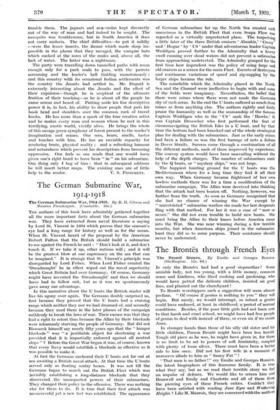The German Submarine War, 1914-1918
The German Submarine War, 1914-1918. By R. H. Gibson and Maurice Prendergast. (Constable. 36s.) TJIF authors of this book have admirably gathered together all the more important facts about the German submarine war. They have extracted from naval literature a saying by Lord St. Vincent in 1804 which proves that the seaman's eye had a long range for history as well as for the ocean. When St. Vincent heard of the proposal by the American Robert Fulton that the British should build a submarine to use against the French he said : " Don'_t look at it, and don't touch it. If we take it up, other nations will ; and it will be the greatest blow at our supremacy on the sea that can be imagined." It is strange that St. Vincent's principle was disregarded by Lord Fisher. When Lord Fisher created the `Dreadnought' he in effect wiped out the naval superiority which Great Britain had over Germany. Of course, Germany might have invented the 'Dreadnought' and then we should have had to follow suit, but as it was we spontaneously gave away our advantage.
In this narrative about the U boats the British reader will live his agony over again. The Germans doubly surprised us, first because they proved that the U boats had a cruising range which neither they nor we had dreamed of, and secondly because they used them in the later phases of the campaign ruthlessly to break the laws of war. Their excuse was that they had a right to retort thus because the Allies by their blockade were inhumanly starving the people of Germany. But did not Bismarck himself say nearly fifty years ago that the " hunger blockade " was " a justifiable object for shortening a war provided that it is impartially enforced against all neutral ships " ? Before the Great War began it was, of course, known that every Navy would establish a blockade as effective as it was possible to make it.
At first the Germans anchored their U boats not far out at sea awaiting a British naval attack. At that time the U boats served only as floating sentry boxes. It was not till the Germans began to search out the British Fleet which was invisibly establishing a long-distance blockade that they discovered the unsuspected powers of their submarines. They changed their policy to the offensive. There was nothing else for them to do. It is true that their first attack was unsuccessful yet a new fact was established. The appearanCe of German submarines far up the North .Sea created such uneasiness in the British Fleet that even Scapa Flow was regarded as a virtually unprotected place. The torpedoing a little later of the three British cruisers ' Aboukir," Cressy and ' Hogue ' by ' U9 ' under that adventurous leader Captain Weddigen proved further to the Admiralty that a heavy swell running over shoal waters did not prevent a submarine from approaching undetected. The Admiralty grasped for the first time how imprudent was the policy of using large and old cruisers as a screen for the main Fleet. Escorts of destroyers and continuous variations of speed and zig-zagging by the larger ships became the rule.
The minefields which the Admiralty placed in the North Sea and the Channel were ineffective to begin with and some of the fields were imaginary. Nevertheless, the belief that there were mines where tthere were not made the Germans shy of such areas. In the end the U boats suffered as much from mines as from anything else. The authors rightly and fairly praise the humanity as well as the seamanship of the famous Captain Weddigen who in the U9 ' sank the ' Hawke.' It was Captain Droescher who first performed the feat of circumnavigating the British Isles in a U boat, and by that time the bottom had been knocked out of the whole strategical plan for dealing with the submarines. Just as the early mines had been a failure so was the first barrage of nets a failure in Dover Straits. Success came through a combination of all the different methods, each of them improved by experience. The convoy system would have been unavailing without the help of the depth charges. The number of submarines sunk by the Q boats, or " mystery ships," was not large.
The happiest hunting ground for the U boats was the Mediterranean where for a long time they had it all their own way. ` When GermanY became frightened of her own lawless methods there was for a time a modification of the submarine campaign. The Allies were deceived into thinking that the attack had been beaten off. Nothing, however, was further from the truth. As soon as Germany recognized that she had no chance of winning the War except by " unrestricted " submarine warfare she made her last desperate fling with that method. For her it was a case of " now or never." She did not even trouble to build new boats. She must bring the Allies to their knees before America came into the War. She was near winning during a few terrible months, but when American ships joined in the submarine hunt they did so to some purpose. Their assistance should never be underrated.


























































 Previous page
Previous page